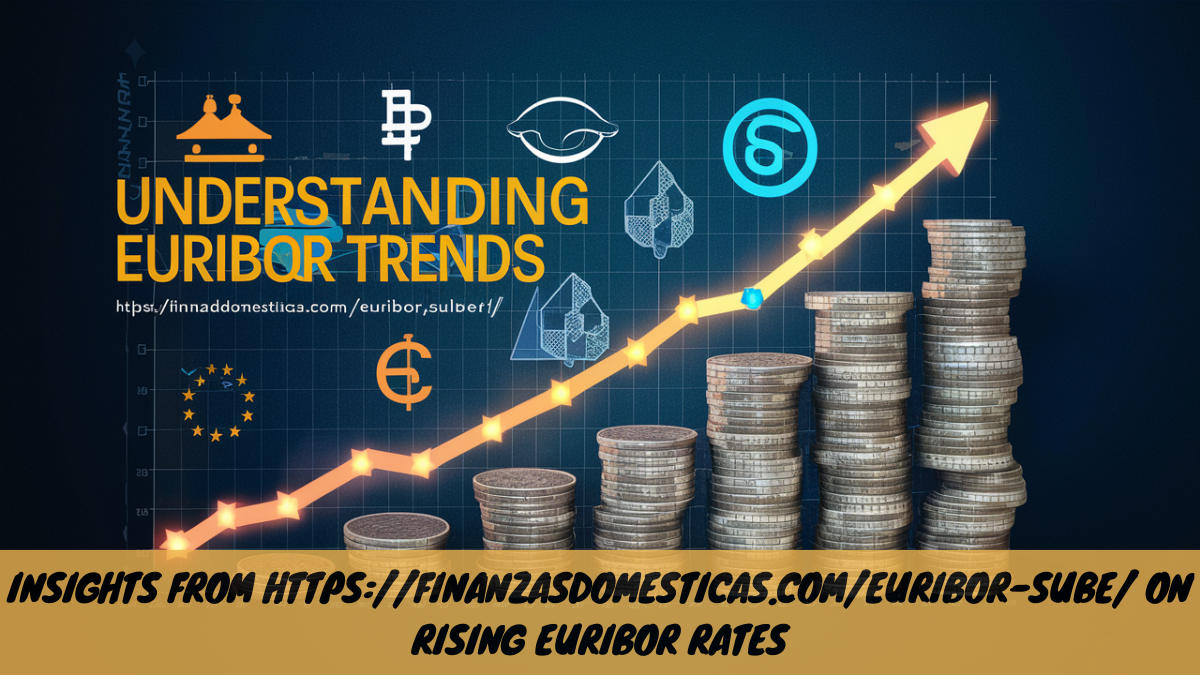Insights from Https://finanzasdomesticas.com/euribor-sube/ on Rising Euribor Rates
The Euribor, or Euro Interbank Offered Rate, is a crucial financial indicator that reflects the average interest rate at which European banks lend to one another. Its fluctuations impact various financial products, including mortgages, loans, and savings accounts. Understanding why the Euribor rises, its implications, and how it affects financial markets and individuals is vital for making informed financial decisions.
Discover insights from https://finanzasdomesticas.com/euribor-sube/ about the rising Euribor, its causes, implications for loans and mortgages, and strategies for managing financial impacts.
This comprehensive guide will delve into the intricacies of Euribor, examining its current rise, reasons behind it, and its broader economic impact.
The website https://finanzasdomesticas.com/euribor-sube/ is a valuable resource for understanding these changes, offering insights and updates on Euribor trends and their implications for financial planning.
What is Euribor?
The Euribor is the benchmark interest rate for interbank lending in the Eurozone. It is calculated daily and published by the European Money Markets Institute (EMMI). The Euribor rates are used as a reference for many financial products, including adjustable-rate mortgages, savings accounts, and other loans.
How is Euribor Calculated?
Euribor is determined based on the rates submitted by a panel of European banks. These rates indicate the interest rate at which they are willing to lend to other banks. The highest and lowest 15% of these rates are excluded, and the remaining rates are averaged to calculate the Euribor.
Types of Euribor
There are several types of Euribor rates, each corresponding to different lending durations. The most common are the one-week, one-month, three-month, six-month, and twelve-month Euribor rates. Each rate reflects the interest expected for lending over that specific period.
For more detailed information on how these rates are set and their impact on financial products, visit https://finanzasdomesticas.com/euribor-sube/.
Why is Euribor Rising?
The rise in Euribor is influenced by several factors, ranging from economic policies to market expectations and global economic conditions.
Economic Policies
- Monetary Policy Changes: The European Central Bank (ECB) influences Euribor through its monetary policy. When the ECB increases its key interest rates, it often leads to a rise in Euribor as banks adjust their lending rates accordingly.
- Inflation Control: To combat inflation, central banks may increase interest rates, which can lead to a rise in Euribor. Higher interest rates make borrowing more expensive, reducing consumer spending and slowing inflation.
Market Expectations
- Future Economic Conditions: If investors expect economic growth, they might anticipate higher interest rates in the future, leading to a rise in current Euribor rates as banks adjust to expected changes.
- Credit Risk Perception: An increase in perceived credit risk among banks can lead to higher Euribor rates. This occurs when banks demand higher interest for lending due to uncertainties in the market.
Global Economic Conditions
- Economic Growth: Strong economic growth can lead to higher demand for borrowing, which may drive up interest rates, including Euribor.
- Geopolitical Events: Global events such as political instability or economic sanctions can affect investor confidence and lead to changes in interest rates.
To stay updated on these factors and how they contribute to the rise in Euribor, visit https://finanzasdomesticas.com/euribor-sube/.
Implications of Rising Euribor
Impact on Mortgages and Loans
- Increased Mortgage Rates: A rise in Euribor often leads to higher mortgage rates, increasing monthly payments for those with variable-rate mortgages.
- Loan Costs: The cost of new loans may rise, making borrowing more expensive for consumers and businesses.
Effect on Savings and Investments
- Higher Returns on Savings: Rising interest rates can lead to higher returns on savings accounts and fixed-income investments, benefiting savers.
- Investment Opportunities: Investors may seek opportunities in sectors that benefit from rising interest rates, such as financial services.
Broader Economic Impact
- Consumer Spending: Higher interest rates can reduce consumer spending, affecting economic growth.
- Exchange Rates: Changes in interest rates can influence currency exchange rates, impacting international trade and investment.
For further analysis of these implications, https://finanzasdomesticas.com/euribor-sube/ offers insights and updates on how rising Euribor rates affect various financial products.
Analyzing the Current Euribor Trends
Historical Context
Understanding past trends can provide insights into the current rise in Euribor. Historically, Euribor rates have fluctuated based on economic conditions, ECB policies, and market expectations.
Current Trends
- Recent Increases: Euribor rates have been rising recently due to a combination of factors, including inflationary pressures and changes in ECB policies.
- Market Reactions: Financial markets have responded to these changes, with adjustments in stock prices, bond yields, and currency exchange rates.
Future Outlook
The future direction of Euribor will depend on various factors, including economic growth, inflation trends, and central bank policies. Monitoring these indicators can help predict potential changes in Euribor rates.
To explore the latest trends and predictions, visit https://finanzasdomesticas.com/euribor-sube/.
Strategies for Managing the Impact of Rising Euribor
For Homeowners and Borrowers
- Refinancing Options: Consider refinancing mortgages or loans to lock in lower fixed rates before further increases.
- Budget Adjustments: Prepare for potential increases in monthly payments by adjusting budgets and cutting unnecessary expenses.
For Savers and Investors
- Diversify Investments: Diversify portfolios to include assets that benefit from rising interest rates, such as bonds and dividend-paying stocks.
- Review Savings Accounts: Take advantage of higher interest rates by reviewing and potentially switching savings accounts to those offering better returns.
For Businesses
- Cost Management: Implement cost-saving measures to offset higher borrowing costs.
- Investment in Growth: Consider strategic investments in growth areas that may benefit from economic changes.
For detailed strategies and advice on managing the impact of rising Euribor, check out https://finanzasdomesticas.com/euribor-sube/.
Insights and Interpretations
The rise in Euribor reflects broader economic trends and offers both challenges and opportunities for individuals and businesses. Understanding these dynamics is essential for making informed financial decisions and navigating the changing economic landscape.
Understanding Economic Indicators
- Inflation and Growth: Keep an eye on inflation and economic growth indicators, as they can influence interest rate changes and Euribor trends.
- ECB Policies: Monitor ECB announcements and policy changes to anticipate potential shifts in Euribor.
Embracing Financial Education
- Stay Informed: Regularly update financial knowledge to understand the implications of interest rate changes and make sound financial decisions.
- Consult Professionals: Seek advice from financial professionals to develop strategies that align with personal or business financial goals.
For additional insights and expert interpretations, visit https://finanzasdomesticas.com/euribor-sube/.
Conclusion
The rise in Euribor is a significant financial development with widespread implications. By understanding its causes, effects, and potential future trends, individuals and businesses can better manage their financial strategies and adapt to changing economic conditions. As we navigate these changes, staying informed and proactive will be key to achieving financial success.
FAQs
1. What is Euribor, and why is it important?
Euribor, or the Euro Interbank Offered Rate, is a benchmark interest rate for interbank lending in the Eurozone. It is crucial because it influences the interest rates on various financial products, including mortgages and loans, affecting consumers and businesses alike. For more details, visit https://finanzasdomesticas.com/euribor-sube/.
2. How does a rise in Euribor affect mortgage rates?
A rise in Euribor typically leads to an increase in mortgage rates, especially for variable-rate mortgages. This can result in higher monthly payments for homeowners, impacting their household budgets. For strategies to manage these changes, see https://finanzasdomesticas.com/euribor-sube/.
3. What are the main factors driving the current rise in Euribor?
The current rise in Euribor is driven by factors such as changes in European Central Bank policies, inflationary pressures, and market expectations regarding future economic conditions and interest rates. For an in-depth analysis, visit https://finanzasdomesticas.com/euribor-sube/.
4. How can individuals manage the impact of rising Euribor on their finances?
Individuals can manage the impact by considering refinancing options for existing loans, adjusting their budgets to accommodate potential increases in payments, and diversifying their investment portfolios to benefit from higher interest rates. For more advice, visit https://finanzasdomesticas.com/euribor-sube/.
5. What should businesses do to adapt to rising Euribor rates?
Businesses should focus on cost management, explore refinancing options for existing debts, and invest strategically
in areas that may benefit from economic changes. Staying informed about economic trends and consulting financial experts can help businesses navigate these challenges. For additional resources, visit https://finanzasdomesticas.com/euribor-sube/.







